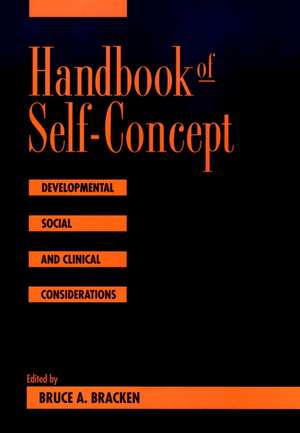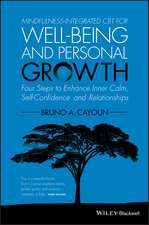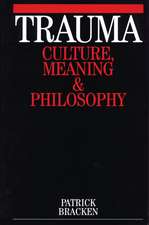Handbook of Self–Concept – Developmental, Social, Clinical Considerations: Wiley Series on Personality Processes
Autor BA Brackenen Limba Engleză Hardback – 28 noi 1995
SOCIAL ORIGINS OF MENTAL ABILITY --Gary Collier
This volume is the first comprehensive, systematic survey of research into the non-hereditary influences on intelligence. Focusing on the cultural, environmental, and social influences on the development of mental abilities, Dr. Collier helps to advance the nurture side of the "nature vs. nurture" debate. He also offers a viable synthesis of supporting facts and ideas from the worlds of psychology, the psychology of personality, and cognitive psychology. This book will have a profound influence upon academe, the psychological community, educators, and policymakers. 1993 (0-471-30407-7) 320 pp.
EGO DEFENSES: Theory and Measurement --Edited by Hope R. Conte and Robert Plutchik
This book explores the nature and manifestations of defense mechanisms and traces ego defense theory and research from Freud's initial conceptualization through recent work in object-relations theory and other psychoanalytically oriented approaches. It provides clinical guidelines for diagnosing, assessing, and dealing with defenses, reviews empirical research techniques, and indicates their value in development and in psychotherapy. This volume should be of value to theoreticians, clinicians, and researchers interested in finding appropriate tools for measurement of defense mechanisms. 1994 (0-471-05233-7) 352 pp.
A THEORY OF PERSONALITY DEVELOPMENT --Luciano L'Abate with Charles H. Bryson
Luciano L'Abate's theories are rooted in social interactions and life experiences, unlike the more traditional, somewhat metaphysical theories of personality development. In this groundbreaking work, he brings to light the heart of his theory, that the ability to love and to negotiate are the sine qua non of personal competence, with the family as the major determinant of both. This book is essential reading for personality researchers, students, and all psychologists in clinical, developmental, abnormal, and social psychology. 1993 (0-471-30303-8) 336 pp.
Handbook of Self-Concept
"If we could see ourselves as others see us, we would vanish on the spot." --E. M. Cioran
It is one of the most intimate of realities and the slipperiest of abstractions. For Sartre it was a double negative and for B. F. Skinner, a set of learned responses. Among exponents of artificial intelligence it is the Oz at the end of the rainbow, while for Voltaire it was an unavoidable pathology. And, ever since William James first identified consciousness of self as a discrete psychological phenomenon, more than a century ago, it has been the source of intense speculation and debate among psychologists.
In the past twenty years alone, over 11,000 studies have been conducted on various aspects of self-concept. Much progress has been made, and a general consensus has been reached about many of its aspects, yet, many fundamental questions remain unanswered, such as: What exactly do we mean when we say "self"? Is self-concept an aspect of a broader cognitive self-system, or is it best defined in behavioral terms? How valuable is self-concept to clinical practice? What roles do age, race, gender, and sociocultural variables play in self-concept?
Bringing together contributions from leading researchers and clinicians from a broad range of psychological disciplines, this book provides answers to these and other important questions concerning self-concept. It explores all theoretical and applied aspects of self-concept, offering a balanced synthesis of the vast body of information on the subject that has accumulated since the 1970s. Chapters address each of the six primary self-concept domains (competence, social, affect, academic, family, and physical) with an emphasis on the clinical significance of each. In the chapter on clinical assessment, existing self-concept scales are subjected to in-depth quantitative and qualitative review, and readers are provided with standardized tables for organizing the principal characteristics reviewed and comparing individual test results. In the concluding chapter, Dr. Bracken describes the clinical applications of a multidimensional, context-dependent model that facilitates the synthesis of information across instruments (including more than 70 psychoeducational tests and scales provided in an appendix) and informants.
Providing practical answers to many of the most important questions about self-concept, Handbook of Self-Concept is essential reading for personality psychologists as well as researchers and educators in developmental, clinical, and social psychology.
Din seria Wiley Series on Personality Processes
- 5%
 Preț: 1484.35 lei
Preț: 1484.35 lei - 5%
 Preț: 1077.50 lei
Preț: 1077.50 lei - 9%
 Preț: 1305.96 lei
Preț: 1305.96 lei - 9%
 Preț: 2105.02 lei
Preț: 2105.02 lei - 5%
 Preț: 1142.72 lei
Preț: 1142.72 lei - 27%
 Preț: 1772.96 lei
Preț: 1772.96 lei - 5%
 Preț: 478.37 lei
Preț: 478.37 lei - 5%
 Preț: 1265.19 lei
Preț: 1265.19 lei - 5%
 Preț: 687.71 lei
Preț: 687.71 lei - 5%
 Preț: 1904.29 lei
Preț: 1904.29 lei - 5%
 Preț: 1771.18 lei
Preț: 1771.18 lei - 5%
 Preț: 1301.53 lei
Preț: 1301.53 lei - 27%
 Preț: 2197.29 lei
Preț: 2197.29 lei - 27%
 Preț: 1089.54 lei
Preț: 1089.54 lei - 5%
 Preț: 2078.76 lei
Preț: 2078.76 lei - 27%
 Preț: 896.55 lei
Preț: 896.55 lei - 27%
 Preț: 1876.63 lei
Preț: 1876.63 lei - 30%
 Preț: 858.84 lei
Preț: 858.84 lei - 29%
 Preț: 770.68 lei
Preț: 770.68 lei
Preț: 2030.62 lei
Preț vechi: 2781.67 lei
-27% Nou
388.56€ • 406.71$ • 323.40£
Carte tipărită la comandă
Livrare economică 31 martie-14 aprilie
Specificații
ISBN-10: 0471599395
Pagini: 560
Dimensiuni: 167 x 240 x 35 mm
Greutate: 0.93 kg
Ediția:00002
Editura: Wiley
Seria Wiley Series on Personality Processes
Locul publicării:Hoboken, United States












